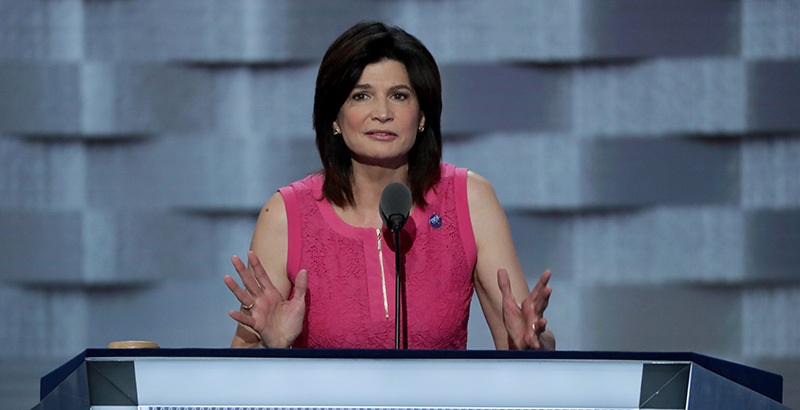Analysis — Why Charter School Supporters Shouldn’t Get Too Excited About That NEA Vote on Endorsements: Any Political Litmus Tests Are Still Up to the Union President

Mike Antonucci’s Union Report appears most Wednesdays; see the full archive.
At the National Education Association Representative Assembly in Houston earlier this month, delegates voted down New Business Item 59, which read:
The NEA demands that all candidates seeking our union’s endorsement publicly state their opposition to all charter school expansion. That would mean repudiating the policies of Arne Duncan and Betsy DeVos. The NEA will publicize this demand by all appropriate means.
There seems to be universal sentiment that the rejection signaled a major change of direction by the union’s 6,000 delegates. NEA and its affiliates have ramped up their rhetoric against charter schools over the past few years, and this was seen as backing off.
Politico: “The vote could signal how tricky this issue may be for unions. While they have blamed charter school growth in some states for taking money away from traditional public schools, some charter school teachers are members of unions.”
Rick Hess at AEIdeas: “In what struck many as a surprising twist, especially in a time of progressive militancy and when Democrats have been more likely to denounce charter schools than defend them, the NEA membership voted the motion down. In other words, the NEA’s Representative Assembly left the way open for the NEA to endorse a Democrat more inclined to seek middle ground on charters.”
Diane Ravitch: “NEA’s decision signals that it is fine if a candidate like Cory Booker or Michael Bennet gives full-throated support to privatization of public schools…. Meanwhile, the candidates who have bravely resisted the lure of billionaire dollars to defend public schools and the right of teachers to bargain collectively get a snub from the nation’s biggest teachers union.”
ICEUFT (a caucus within New York City’s teachers union): “Its rejection by the NEA could mean the NEA and [American Federation of Teachers] are leaning toward a safe middle of the road endorsement for POTUS.”
All these things may be true, but they had little to do with why NEA delegates voted down item 59. The real reason: Defending the union’s political endorsement process was more important than taking a stand on charter schools and mandating a litmus test for presidential candidates.
The measure was introduced by Mark Airgood of the Oakland Education Association. Airgood is a prominent member of the By Any Means Necessary coalition, a social justice group that operates on the leftmost fringe of the teachers union. He and his compatriots are responsible for many of the incendiary items that come before the representative assembly.
His rationale for item 59 was: “Charter schools exist for one purpose: to cheapen education and strip young people and their families of the right to a public education. Equal, quality public education for all cannot be accomplished by the market economy.”
Although NEA delegates are considerably more liberal than the average American, they are not in Airgood’s camp. This year, when he sought a spot on the union’s executive committee — his latest run for NEA higher office — he picked up just 2.9 percent of the vote.
His item came with an additional cost to the NEA budget of $134,745. That alone might have put an end to the idea, but the real reason it lost was because it would have attached a new string to the NEA endorsement process: It implies that the NEA president would be bound to select a candidate who made the declaration.
After behind-the-scenes subterfuge that accompanied NEA’s endorsement of Hillary Clinton in 2016, delegates have introduced a number of measures to alter the union’s presidential endorsement process, and they all have gone down to defeat. The majority of delegates will very rarely vote in favor of something they know is opposed by the union leadership.
There is already a type of checks-and-balances system, a series of representative bodies within the NEA that vote on presidential endorsements — the PAC Council, the Board of Directors and the Representative Assembly. But their vote is only to concur, or not, with the choice made by the NEA president.
It’s conceivable, though unlikely, that these bodies can keep rejecting candidates until they get the one they want. But it’s also true that the NEA president can refuse to put forward another candidate for a vote.
This played out in the 2008 Democratic primaries, when there was considerable NEA support for Hillary Clinton in a close race. However, then-NEA President Reg Weaver was an Obama supporter. He didn’t send any endorsement to the union’s representative bodies, and NEA didn’t end up endorsing Obama until after he clinched the nomination.
Item 59 would have changed this dynamic. But the delegate vote ensured that NEA President Lily Eskelsen-García, in the last year of her term, can choose any candidate, without regard to that candidate’s position on a single issue. She might make that choice with due consideration of what it means for the union’s charter school strategies, or she might not.
Both Obama and Clinton were wobbly (by NEA standards) on charter schools — and the union endorsed them anyway. In 2020, the union might decide to choose a different litmus test from a wide variety of issues.
How and if it gets applied is up to one person: Lily Eskelsen-García.
Get stories like these delivered straight to your inbox. Sign up for The 74 Newsletter

;)